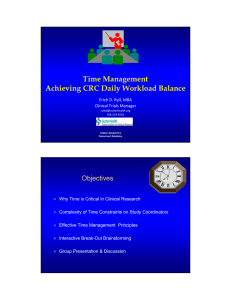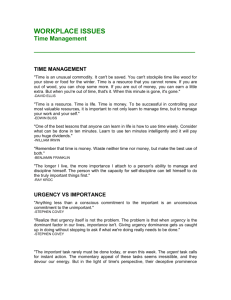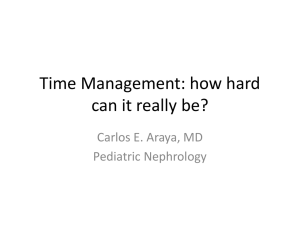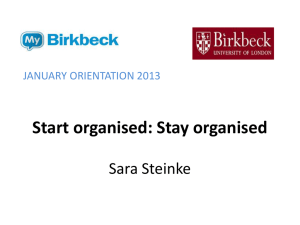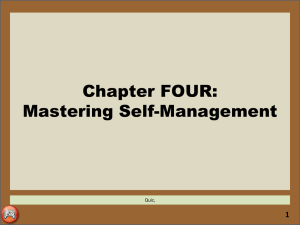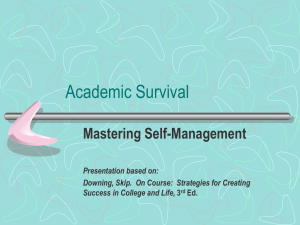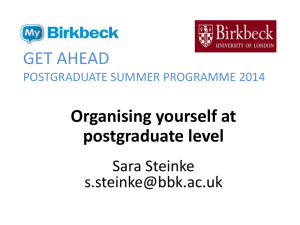Why Time is so Critical in Clinical Trial Research
advertisement
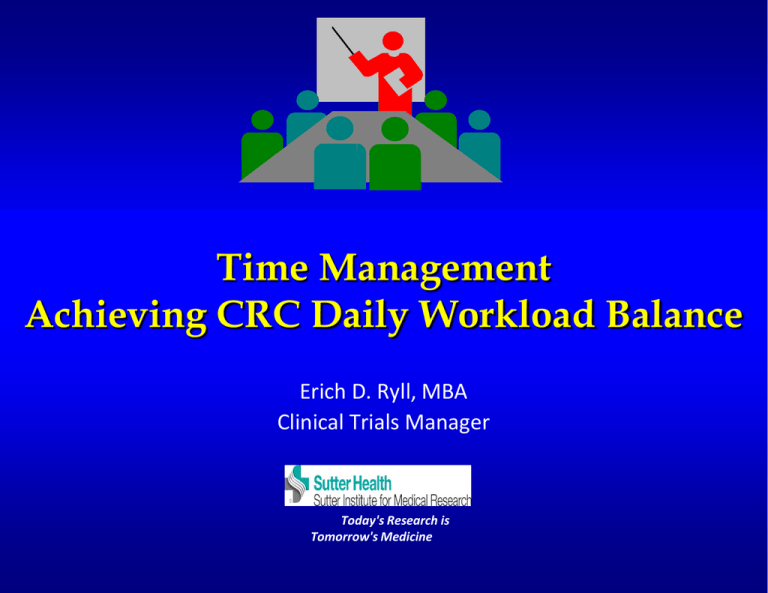
Time Management Achieving CRC Daily Workload Balance Erich D. Ryll, MBA Clinical Trials Manager Today's Research is Tomorrow's Medicine Objectives Why Time is Critical in Clinical Research Complexity of Time Constraints on Study Coordinators Effective Time Management Principles Interactive Break-Out Brainstorming Group Presentation & Discussion If it Weren’t for Time, Everything Would Happen at Once... But This is Clinical Research – Maybe it Does! New Study Patients & PI Feasibility? Patient Consent and Enrollment Study Start-up Sponsor required Training Pre-Study Mtg. Source Doc Prep IM/SIV Mtg. IRB Approval Budget & Contract Reg Doc Submission Why Time is so Critical in Clinical Trial Research Every day a new investigational drug is not on the market, the Sponsor loses ~$1M/day loss in return on investment. Timelines/complexity for drug development milestones are shrinking while regulatory constraints tighten = > complexity of protocols & GCP compliance demands. Multiple stakeholders in the process of every trial have increased due to all facets of trial conduct being delegated to vendors. (e.g. CROs, IWRS, eDiaries, EDC, etc.) Stemming Global Morbidity & Mortality Demand Rapid Drug Development Ticking Epidemiological Time-Bombs: Age-specific incidence of Alzheimer’s disease (per 1000 person years) across continents and countries. Dialogues in Clinical Neuroscience 2009 Need for Rapid Drug Development – Cont. Guarding public safety - Vaccine Development (Influenza, Ebola) The urgent call to save or extend lives – cancer & oncology trials - discovering new treatments (Pharma) & developing/refining treatment algorithms (NCI Trials) Patients are waiting, and the drugs we all help develop each and every day may make a difference in your own life, or a loved one, down the road. The Study Coordinator Changing Landscape: More Work, But the Same Amount of Time to Deliver Results A 2012 CenterWatch Survey of 269 Study Coordinators worldwide Found: Number of trials actively managed by CRCs has increased 7% annually over the past 10 years. The median number of managed by a study coordinator on an annual basis jumped from 4.3 in 2001 to 7 at the end of 2012. The typical study coordinator in 2012 personally oversaw an average of 80 patients on an annual basis. A third of all CRCs believed that higher workload demands impacted their ability to complete their tasks and do their job well. How Many Things Can You Juggle Each Day? Patient Calls Patient Visits Monitor Calls/E-mails IWRS Registration Clinical Team Updates Source Doc Patient Visit Progress Notes EDC Entries/Queries PI Calls/Discussions Reg Doc Handling THE LIST GOES ON.... What it Feels Like... Study Coordinators - Miracle Workers to the Rescue! Enter The Need for Time Management “Procrastination is the foundation of all disasters.” Pandora Poikilos “The bad news is time flies. The good news is you're the pilot.“ Michael Altshuler Productiveness by the Day of the Week? In a survey by Accountemps 150 executives were asked, “On which day of the week are employees most productive?” Their responses: Monday 12% Tuesday 57% Wednesday 11% Thursday 11% Friday 3% Don't know 6% 14 Determining What is Urgent: Stephen Covey’s Time Management Grid URGENT I M P O R TA N T NOT I M P O R TA N T NOT URGENT Quadrant I: Urgent & Important Quadrant II: Quadrant III: Quadrant IV: Not Urgent & Important Urgent & Not Important Not Urgent & Not Important Determining What is Urgent: Stephen Covey’s Time Management Grid In Quadrant 1 (top left) we have important, urgent items – items that need to be dealt with immediately. In Quadrant 2 (top right) we have important, but not urgent items – items that are important but do not require your immediate attention, and need to be planned for. This quadrant is highlighted because Covey emphasizes this is the quadrant that we should focus on for long term achievement of goals In Quadrant 3 (bottom left) we have urgent, but unimportant items - items which should be minimized or eliminated. These are the time sucks, the “poor planning on your part does not constitute an emergency on my part” variety of tasks. In Quadrant 4 (bottom right) we have unimportant and also not urgent items – items that don’t have to be done anytime soon, perhaps add little to no value and also should be minimized or eliminated. These are often trivial time wasters Don’t Over Commit If you commit to every request with ‘yes’ for your time each day, then you will never make good use of your time. Make an effort to only commit to things that you can realistically accomplish with the time you have available. What is urgent and achievable? – triage what can, cannot be done in each work day to best maximize your time. Have a Plan for your Time Each of us is different and not everyone works in the same way. Some people like ‘to-do’ lists, others do not. Regardless of your preferred approach or preferences, you need a method for planning your time allocation each day/week/month. ‘Develop a plan - work the plan’. Allow Time for the Unexpected It never fails, ad hoc unexpected issues will come up and demand your time and attention. If you use a ‘to-do’ list populate it with 75-80% of time anticipated to complete the task. If you stretch your day’s planned activities to 100%+, there will be no room for the unexpected. Handle Things Once Instead of starting a task, only to park it and go back again later, try to take on tasks you know you can complete just once. E-mail is a great example. If you need to respond, do so, and don’t leave and come back later, as it is very easy to overlook. You achieve a better sense of accomplishment if you do things once, and then they are off your plate and completed. Create Realistic Deadlines Sponsors have all manner of deadlines they impose. Its equally important to set your own, otherwise you may lose control. This leads to multiple tasks started, while not all may be completed. If a task will involve a large time commitment, break it down into components and set a deliverable timeline that fits in with your other tasks for the day/week/month. You want to do your best work, so setting realistic timelines for all the multiple tasks you have on your plate will help you not feel overwhelmed. Set Goals for Yourself and Your Time Unlike deadlines, goals help you achieve maximum efficiency. Goals work best for routine work, not unexpected deadlines or ad hoc issues that arise. They also help you determine over time how to best manage within your own preferred style for daily/weekly/monthly tasks. Develop Routines Habits and routines can be very powerful time management tools. Used effectively, they can help you get more done and make better use of time. You can develop daily routines and weekly routines to manage around your patient visits and all the F/U. Establishing a calendar of times/days for the routines will also be helpful. Habits and routines also lend themselves to feelings of being in control and accomplishment. They can often make the difference between controlling your work, or your work controlling you. Focus on One Thing at a Time Multi-tasking is overrated, and hard to avoid in clinical research. The best work is never accomplished attempting to do too many things at once. If you plan well, and set your own goals and deadlines, you will be able to focus on your tasks, and can control the completion while maintaining the best quality. Eliminate or Minimize Distractions Eliminating distractions are also difficult to avoid in clinical research – we are bombarded daily with them. You can’t totally eliminate them, but you can reduce them. You can choose not to look at e-mail, or let the phone go to voice mail. Then as tasks are completed, then catch up with messages and e-mails. Recognize distractions that impede your progress, and find mechanisms to reduce them to maintain control of your output. Outsource Tasks of Delegate When Possible Depending on the staffing of your site, you may not be able to delegate many tasks. However, a clinical trial is a collaboration between a coordinator, sponsor and PI. Don’t be shy in requesting assistance as needed to save you time and effort along the way. For those with other coordinators in the team, don’t suffer in silence, ask for help or ideas from your colleagues. Leave Time for Fun & Play Study Coordinators who are good time managers learn how to achieve a balanced life. Nothing should be so critical in your work that you cannot leave time for your own life. Getting time away from work is essential for dealing with stress, refreshing your energy, and for living a balanced life. It is very easy in clinical research to burn out. That simply serves no purpose for anyone. “The Two Most Powerful Warriors are Patience and Time” - Tolstoy Time management takes perseverance. Being a Study Coordinator defines the essence of perseverance. Persevere when things don’t go right. Develop strategies for dealing with pressure such as taking regular exercise. Take a positive attitude towards mistakes: that’s when we can learn the most. With an effective time management plan, and taking one step at a time, you will reach the top of any mountain! Break-Out Session Brainstorming 30 Rules for Break-Out Sessions The audience will be broken up into 4 groups. You will have 15 minutes to discuss & reach consensus for completing your Time Management Grid and ‘To’-Do’ list. There will be 5 minutes to present your results to the full audience, followed by discussion with the full audience. First appoint a scribe in your group to take notes, then appoint the presenter. Then read the group exercise handout and discuss within your group . Rules for The Scribes & Presenters Complete the Time Management Grid on the hand-out first. (scribe) Next complete the ‘To-Do’ list on the handout using the numbers of the task. (scribe) Then present your results to the full audience and we can open it up to the entire audience for feedback and discussion. (presenter) First Populate the Grid on Page 3 Record your Break-Out Group # on the worksheet: Quadrant I: Urgent & Important Quadrant II: Not Urgent & Important Quadrant III: Urgent & Not Important Quadrant IV: Not Urgent & Not Important Then Develop your ‘To-Do’ List on Page 4 Decide what can be done on Monday describing the task and task number. Then describe how the other tasks can be put off to another day, week, or later. We will re-convene after 15 minutes to discuss each group and get feedback from the entire audience. Conclusions Trials have become more complicated. CRCs need to constantly refine how to become efficient time managers to accommodate constant changes. Establishing time management principles to better organize and triage what can be done and when will drive efficiency. Develop a plan that works best for you and establish habits and routines that allow you to control your deliverables. Q&A “He who every morning plans the transaction of the day and follows out that plan, carries a thread that will guide him through the maze of the most busy life. But where no plan is laid, where the disposal of time is surrendered merely to the chance of incidence, chaos will soon reign. “ Victor Hugo
